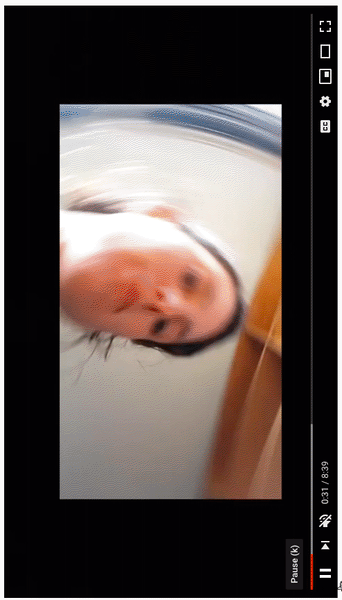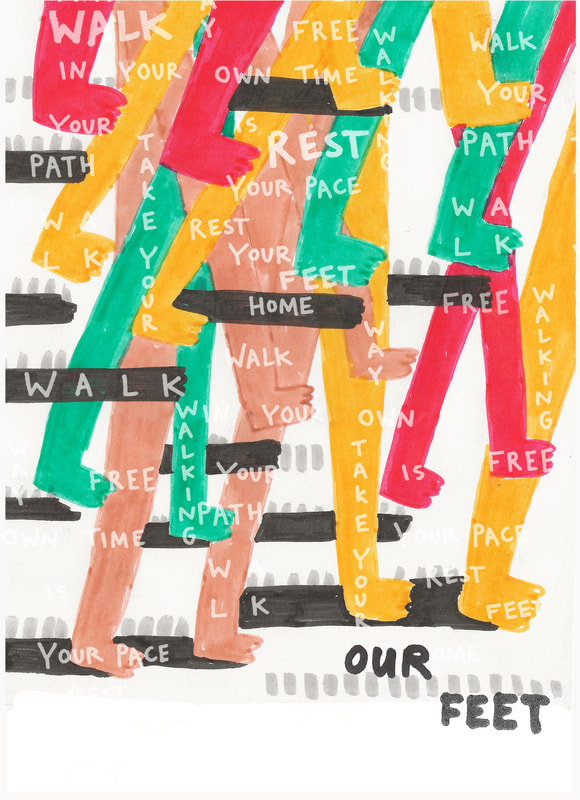This text is adapted from a provocation given as part of the Walking's New Movements conference at Plymouth University, 2 November 2019
FROM WORKING
This story starts with me working in a job. An administrator at a Redbrick university, exchanging forty hours of my week for a decent wage.
It was the most money I had ever earnt, and one of the most challenging environments that I’ve ever worked in. Imposingly hierachical, deeply colonial, increasingly neoliberal. And also a really rich environment where thanks largely to the people I was working with, I was introduced to new texts and ideas (such as decolonization and neoliberalism)[i]. It was in this context that I started thinking about the labour that makes up our society..
|
"By draining people’s physical and mental energies, work that is alienating ensures that much of the worker’s non-work time is spent winding down, retreating to escapist forms of entertainment, or consuming treats which compensate for the day’s travails.”
David Frayne - Refusal to Work |
“It is not an accident that most men started thinking of getting married as soon as they get their first job. This is not only because now they can afford it, but because having somebody at home who takes care of you is the only condition not to go crazy after a day spent on an assembly line or at a desk.” Silvia Federici - Wages Against Housework |
|
I had to agree that the work didn't stop when I left the office. There was a great deal of unpaid work I needed to do in order to show up physically and emotionally available to perform my duties, and to fit into the ‘professional’ box that had been outlined for me.[ii]
I found myself with less time to walk to work, and more money for Ubers. Less time to relax, but more money for wine. Less time to fix my clothes, but money for new ones. This exchange of time for money bargained with my mental health and caught me in a shitty contract with privilege, oppression and global exhaustion. 🌿🔫 All the while, time rolled by so fast, and it was harder to distinguish days, weeks or months from each other. In the fantastic kids book ‘Momo’, Michael Ende describes the men in grey, who descend upon a town and encourage adults to save their time by paying it into the bank. This quote sums up how I had started feeling about my working life: “People never seemed to notice that, by saving time, they were losing something else…. For time is life itself… . and the more people saved, the less they had.” |
TO WALKING
So, I saved up my wages, expended my privilege, and I quit. And that clock, that routine, stopped. For the last 5 months I have been living and working with a strange, nomadic project called Land In Curiosity (LiC). Walking and wild camping as an alternative to paying rent, and experimenting with something we call ‘regenerative cultures’.
|
Sometimes people are surprised to find out that as a ‘walking project’ we rarely walk more than a couple of hours a day. Walking is not our purpose, it is a method that supports a different pace and way of life. It’s a cliché, but it’s true to say that the focus really is on the journey rather than the destination. Because of this, we can take it slow. We can stop to nap beneath a tree if we feel the need, or to watch a slug dangle from a thread of mucus, or for a cup of tea, if someone is kind enough to offer.
|
Are you students? (No) Is it for charity? (No, we’re not girl guides either..) |
Most jobs in this country still expect us to work on schedules like machines. We clock in, produce, we clock out. And again the next day, all of us like clockwork. On LiC’s walks, we try to account for the fact that people have different paces and rhythms. We have routemarkers, who lead the way and mark a trail for people behind to follow in their own time. We designate a timekeeper, who holds the time for anyone who doesn’t want to keep checking their watch. The clock has taken on a different quality. We rarely know which day of the week it is, but we are acutely aware of the changing seasons. Major events are when the sun comes up and goes down; when the full moon is bright enough to light up the night; when the nettles seed, when the beech nuts drop, when the mosquitos die down. We bustle like the birds on sunny days, and like them, damply shelter when it rains.
Most female bodies know - if only we listened - that productivity is part of a cycle rather than a constant mode. As a female led organisation, when we bleed, we slow down, prioritise ease and comfort. We have the opportunity to see rest and recuperation as part of the work of our project - not something that people have to scramble to do in their evenings and weekends.
Most female bodies know - if only we listened - that productivity is part of a cycle rather than a constant mode. As a female led organisation, when we bleed, we slow down, prioritise ease and comfort. We have the opportunity to see rest and recuperation as part of the work of our project - not something that people have to scramble to do in their evenings and weekends.
TO RESTING
|
So, what’s all this about the loss of leisure? It sounds idyllic! Well, not quite. Nomadic life involves plenty of labour: There’s the physical work of carrying heavy bags and finding a new home each night (like fugitives in a country where nearly all land is private), making fire and fetching water; not to mention the emotional work of trying to live in close community.
After all this, we hardly had any time to properly rest, let alone work on the creative, personal, and organisational projects we had set out to do. Despite the ideals and values that I’d set out with, I found myself getting frustrated when emotional responses got in the way of our productivity.📉 I even missed the days in the office when I would get SO MUCH DONE! Without clearly marked boundaries between work and leisure, I found it even harder to switch off the sense of responsibility, to the extent that I struggled to prioritise or even acknowledge my most basic needs (food, rest, expression, warmth, movement, etc). I found myself in front of a mirror in which I saw how deeply I have internalised one of the shittiest aspects of patriarchial, colonial, high fucking-consumer capitalism: the notion that my value equals what I produce or achieve. This obsession with growth and productivity, which is responsible for so much of the damage that we humans create. For the crap piling up in landfills, chemicals flooding our rivers, harmful gases clogging up our air. And the very same thing within our bodies, and the bodies of people across the globe, which are overworked, stressed, abused, drugged and ignored. All in the name of productivity. At LiC we don’t have the answers; we are babies in this work, learning as we go. But we have some great teachers. We’ve been hugely inspired by Adrienne Maree Brown, who suggests that what we embody and enact in our interior life, in our relationships, in our organisations, echoes out, for better or worse. And of course, our great guide mfther nature, who reveals endless wisdom through her work including countless examples of systems that tend towards balance. One thing I have become sure of is that the answer to our problem will lie, at least in part, in our ability to reconnect to that which capitalism has made a project of discrediting. That is, the wisdom of our physical body and our wider bodies. [ii] This time I’m listening. After a long summer of walking with LiC, our bodies are telling us, slow down! It’s autumn now and as the leaves fall, it’s time for blood to sink back to the earth.[iii] Rest. Reorientate. Integrate Take time. And know that this is a radical and regenerative act <3 |
[i] By 'Coloniality' I mean the exploitation and oppression of people and cultures by invaders or settlers. By 'Neoliberalism' I mean deregulated global markets, privatisation and austerity. Or, put another way, seeing society as a marketplace, life as a race, and people as profit/loss.
[ii] Thinkers I am indebted to for this piece: Silvia Federici, Melissa Gregg, Theodor Adorno, David Payne, Mama D Ujuaje, The Nap Ministry. [iii] Frayne: Refusal of Work: Free Time and the Pressures of Employability [iv] By 'WIDER BODY' I mean our environment, our communities, our family, friends, conscience and intuition, spirituality or God if we have one. [v] Rainer Maria Rilke, Onto a Vast Plane. See https://onbeing.org/programs/joanna-macy-a-wild-love-for-the-world/ |


